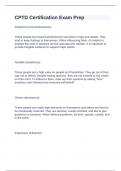CPTD Certification Exam Prep
Analytical (conscientiousness)
These people tend toward perfectionism and deal in logic and details. They
tend to keep feelings to themselves. When influencing them, it's helpful to
prepare the case in advance and be accurate and realistic. It is important to
provide tangible evidence to support major points.
Amiable (steadiness)
These people put a high value on people and friendships. They go out of their
way not to offend. Despite having opinions, they are not inclined to say what's
on their mind. To influence them, draw out their opinions by asking "how"
questions and showing how everyone will benefit.
Drivers (dominance)
These people can make high demands on themselves and others and tend to
be emotionally reserved. They are decisive, results oriented, and like to give
guidance to everyone. When influencing drivers, be brief, specific, candid, and
to the point.
Expressive (influence)
,These people are social types. They are enthusiastic, creative, and intuitive
but have little tolerance for those unlike themselves. Easily bored, they tend to
go off on tangents. When influencing this type, it is useful to stick with the big
picture, avoid details, and make it exciting.
Goleman’s Five Competencies of Emotional Intelligence
Acronym: MESSS
Personal Competencies
Self-awareness. Self-awareness entails knowing one’s own internal states,
preferences, resources, and intuitions. Those who are strong in self-
awareness can monitor their emotional state and realize what they are feeling
and why.
Self-regulation. The capacity to self-regulate means being able to manage
one’s internal states, impulses, and resources. People who are strong in self-
regulation, also called self-management, can control or redirect their impulses
and moods in the moment. This involves the ability to suspend judgment and
think before responding, even in difficult situations.
Motivation. Motivation involves the ability to understand emotional tendencies
that facilitate reaching goals. A person who is strong in motivation
demonstrates an internal passion to achieve and pursues goals with energy
and commitment
Social Competencies
,Empathy. Recognizing emotional needs in others and effectively supporting
them in the way that they require is a key to interpersonal relationships. It is
the ability to view and understand other’s feelings, needs, and concerns.
Social skills. Social skills involve managing relationships and building
networks in a way that results in being looked on favorably by others. A
person who excels at social skills can find common ground with others in a
way that builds rapport and connection.
Thomas-Kilmann Conflict Model
AACCC
Ali x2 is a C*nt x3
Competing. Using a competitive response, the individuals seek to satisfy their
own needs without regard to, and often at the expense of, others involved.
Accommodating. Accommodators neglect their own concerns to satisfy the
concerns of other people.
Avoiding. In this response, individuals do not address conflict. They do not
seek to satisfy their own interests or the interests of others.
Collaborating. Collaborators work with others to find a solution that fully
satisfies all interests.
Compromising. Compromisers seek to partially satisfy all participants.
, 4 Basic Components of a Process
Acronym: ICOR
Inputs. Process inputs are the individual items that are required to perform the
process. Traditionally these are called the 4 Ms and an E: methods, materials,
machines, man, and environment.
Controls. Process controls are the information and physical controls that have
been developed for the process. Drawings, specifications, procedures,
education and training, performer experience, data, competitors, and
information are examples of process controls.
Outputs. Process outputs can be either intended or unintended and are
defined by determining the process’s desired result. Typically this is
determined from customer requirements and specifications. The customer can
be either internal or external. Completed purchase orders, finished products,
facilitator manuals, and paid employees are examples of process outputs.
Resources. Process resources are the equipment, systems, and human
resources required to perform the process. Heating, water, and electrical
systems; physical plants; equipment and machinery; and personnel are
examples of process resources. Resources are not consumed in the process.
They remain available for the next run of the process.
Continuous Improvement Model




